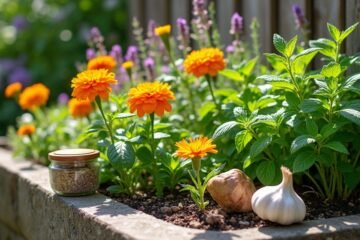Choosing organic pest control for your small garden is like giving your plants a superhero cape! It protects them from harmful pests while encouraging friendly butterflies and ladybugs to join the party. With smart techniques like using neem oil or marigolds, your veggies not only stay safe but also taste wonderful! Who wouldn’t want their garden buzzing with life? Plus, it’s a fun way to promote a healthier planet! Ready to discover more exciting methods?
Benefits of Organic Pest Control in Small Gardens

When it comes to small gardens, organic pest control isn’t just a choice; it’s a game changer! Imagine tending your precious plants without worrying about harmful chemicals. You can cultivate a thriving ecosystem right in your backyard! By using organic methods, you’ll not only protect your plants but also invite beneficial bugs—think friendly ladybugs and tempting butterflies. Plus, organic pest control enriches your soil, giving your veggies a delicious boost—as if they’re getting a skincare routine! You’re making a statement, too; you’re showing love for the Earth! Why not make your small garden a haven for health and harmony? Remember, every tiny effort counts in creating a greener future for everyone. Isn’t that something worth celebrating?
Common Organic Pest Control Methods
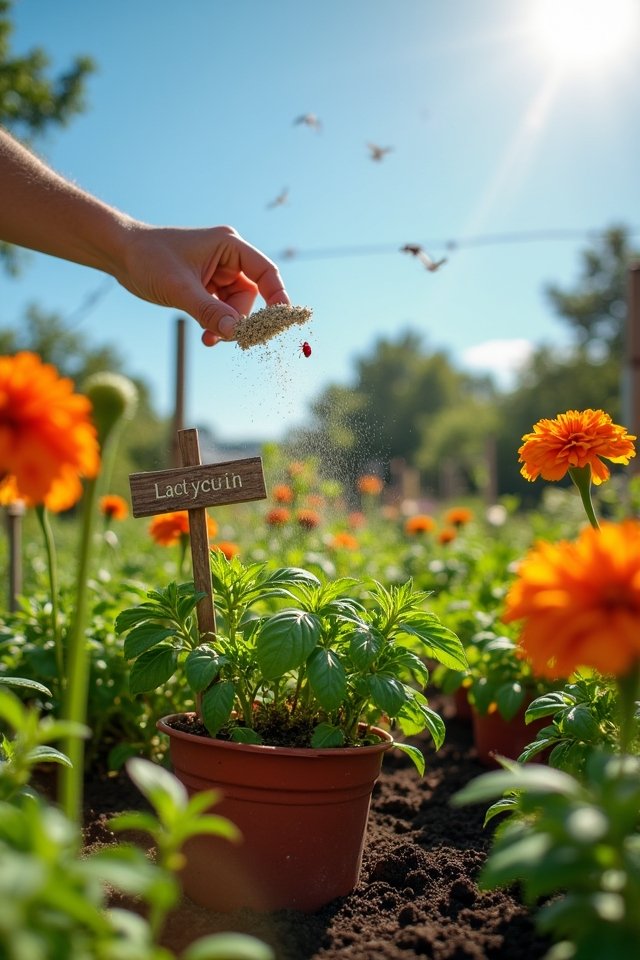
To keep your small garden buzzing with life, you’ll want to explore some tried-and-true organic pest control methods! Ever thought about using neem oil? This magical elixir not only repels pests, but it also nourishes your plants! Or how about planting marigolds? These vibrant beauties act like nature’s bodyguards, keeping unwanted visitors at bay! For those stubborn bugs, you can whip up a soapy spray—just mix water and a few drops of dish soap, and voila—instant pest repellent! And don’t forget about beneficial insects like ladybugs; they’re like tiny superheroes in your garden! Using these methods can be fun and innovative, ensuring your plants thrive while the critters take their leave. Immerse yourself and watch your garden flourish!
How to Identify Pests in Your Small Garden
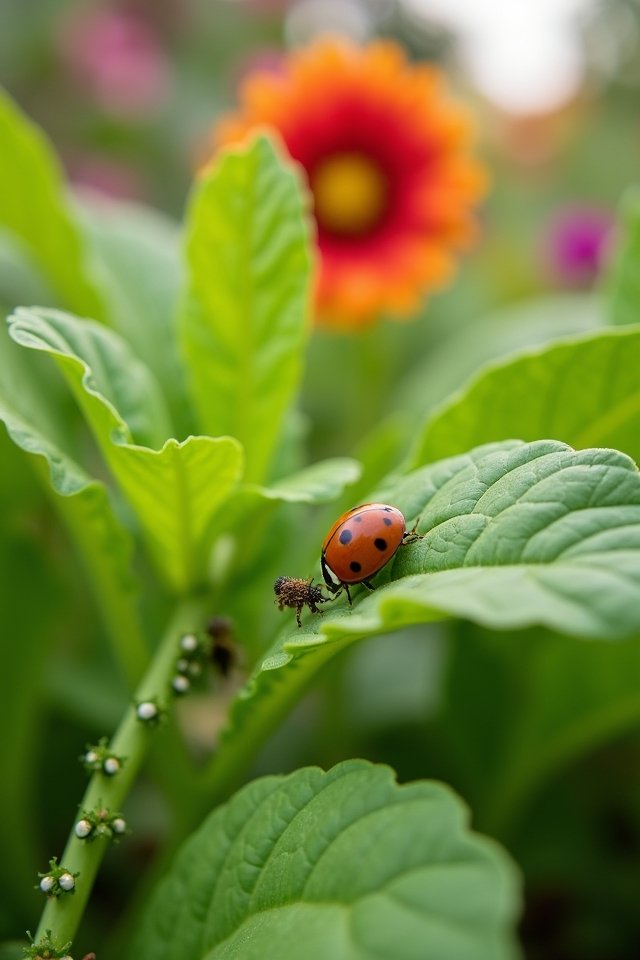
How can you tell if your beloved plants are facing a pest invasion? It’s time to become a plant detective! Look for some telltale signs—these mischievous pests love to hide, but they leave clues everywhere. Here’s what to watch out for:
- Tiny holes in leaves, like tiny bites taken from a cookie!
- Sticky residue on your plants, which might mean sap-sucking culprits are at work.
- Yellowing or wilting leaves, as if your plants are waving a white flag.
- Silken webs, like a spooky Halloween decoration, hint at spider mites.
- Unusual droppings or patches—sounds gross, but it’s essential info!
Stay alert, and catch those sneaky pests before they wreak havoc on your precious garden!
Sustainable Practices for Organic Pest Management
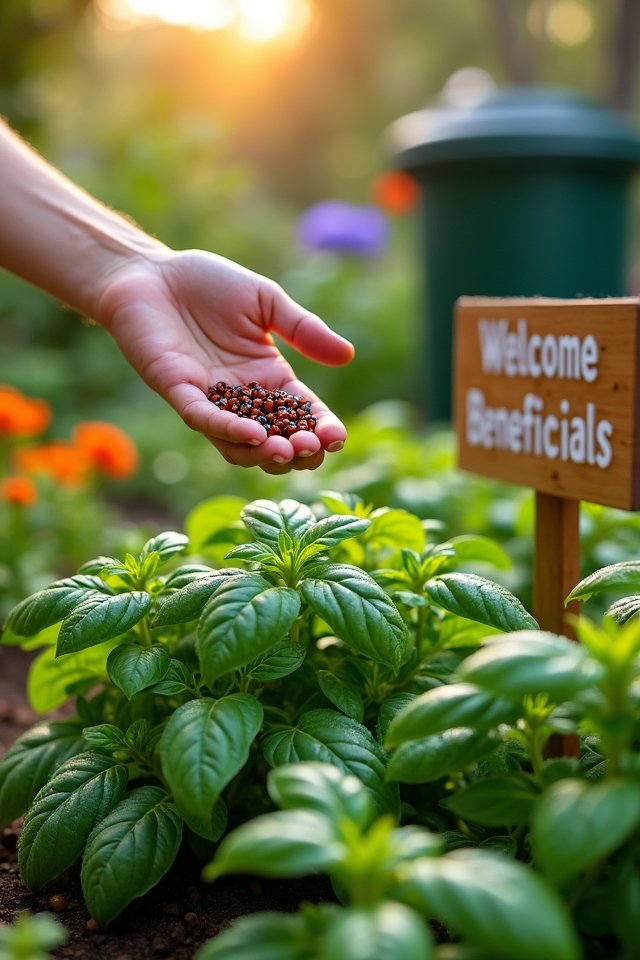
Embracing sustainable practices for organic pest management is like inviting your garden to a fabulous party—who wouldn’t want to celebrate healthy plants? You can start by introducing beneficial insects like ladybugs and lacewings; it’s like hiring nature’s little bodyguards! Companion planting works wonders, too—think of tomatoes and basil teaming up like superheroes against pests.
Don’t forget to use homemade sprays, like a garlic concoction, as a spicy surprise for unwanted critters. Crop rotation keeps pests guessing, just like changing the playlist at a dance party!
Opt for organic fertilizers that feed your soil, creating a vibrant community of earthworms. When you mix these practices into your gardening routine, you’re not just fighting pests; you’re nurturing a thriving ecosystem!
Success Stories: Thriving Small Gardens With Organic Solutions
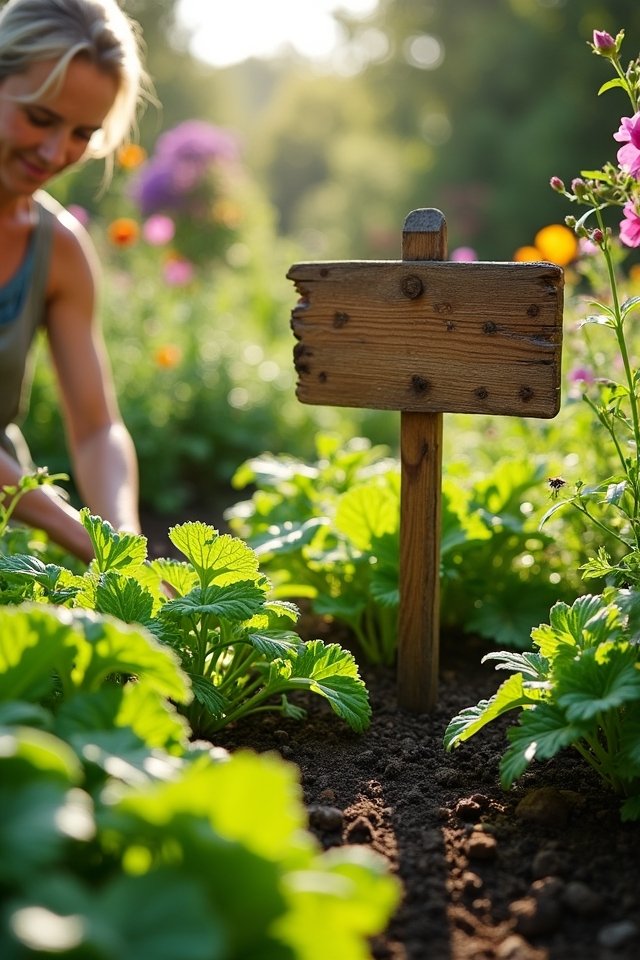
Nothing quite captures the magic of a small garden thriving on organic solutions like the countless stories of gardeners who’ve made it happen! Imagine colorful veggies sprouting, butterflies fluttering, and the smell of fresh herbs wafting in the air. These stories shine with inspiration!
Here’s what successful gardeners are doing:
- Using companion planting to deter pests naturally
- Making homemade sprays from soap and hot peppers
- Attracting beneficial insects like ladybugs
- Employing crop rotation to maintain soil health
- Creating compost from kitchen scraps for nutrient-rich soil
With these innovative methods, you’ll not only grow your garden but also cultivate joy! Are you ready to join the ranks of eco-friendly enthusiasts?
Frequently Asked Questions
Is Organic Pest Control Safe for Pets and Children?
Absolutely, organic pest control‘s a fantastic choice for safety! Unlike harsh chemicals, it’s like wrapping your garden in a cozy, protective blanket. You won’t have to worry about your curious pets or little ones getting into trouble! Natural solutions like neem oil or diatomaceous earth work wonders without harmful side effects. It’s a win-win! So, let those tiny hands and paws explore the garden, while you enjoy peace of mind! Isn’t that great?
How Long Does It Take to See Results From Organic Methods?
Imagine this: you’re waiting for your delicious apple pie to bake, but your garden’s pests don’t get the patience memo! With organic methods, you might see results within a week or two—some methods can work even faster, like attracting beneficial insects! It’s like watching a good movie; you can’t rush the great parts! Stick with it, and soon, you’ll enjoy a thriving, pest-free paradise without the harsh chemicals. How sweet is that?
Can I Grow Vegetables Alongside Flowers in Organic Gardens?
Growing vegetables alongside flowers is a fantastic idea! Just imagine vibrant sunflowers towering over your spinach, attracting pollinators while they admire! Those colorful blooms can help confuse pests, too. Choose companions like marigolds to ward off harmful insects or plant basil near tomatoes for a flavor boost. You’re inviting a symphony of colors, scents, and delicious treats! So, let those veggies and flowers mingle, creating a delightful garden party that nature would envy!
Are There Any Pests That Can’t Be Controlled Organically?
You might be wondering if there are pests that can outsmart organic methods. Well, pests like root aphids or certain caterpillars can be tricky! While you can often manage them with natural predators or homemade remedies, sometimes they’re as stubborn as a mule! That said, don’t throw in the towel! Keeping a diverse garden and regularly monitoring can outwit those pesky intruders, making your garden flourish with color and life! Isn’t that inspiring?
How Often Should I Apply Organic Pest Control Methods?
Think of your plants as star athletes; they need regular care to shine! You should apply organic pest control methods every 7 to 14 days, especially after rainfall. Just like watering, consistency is key! If you notice pests staging a comeback, don’t hesitate to reapply sooner. Made from natural ingredients, these methods keep your garden healthy and vibrant! Who knew protecting your greens could be so rewarding? Happy gardening!
